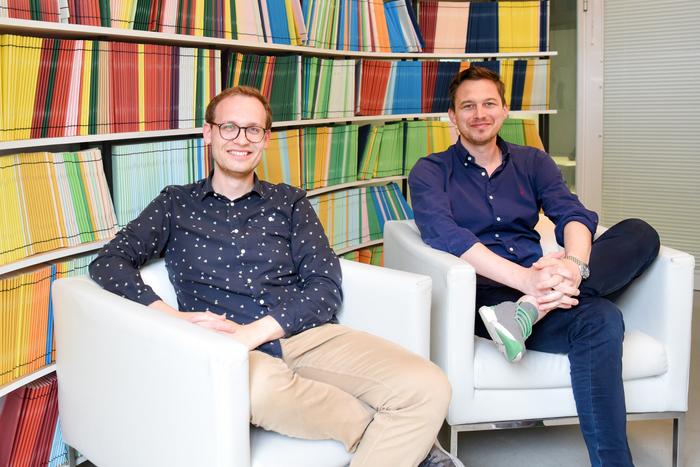Nightshade plants produce a diverse array of compounds with therapeutic potential. Researchers at CeMM have now identified an artificial variant inspired by the Withanolides group that acts highly specifically against leukemia cells. Using state-of-the-art chemical and genetic high-throughput analyses, the team led by Georg Winter not only confirmed its effectiveness but also elucidated its mechanism of action: the molecule disrupts the cholesterol metabolism of tumor cells. The study’s findings were published in the journal Nature Chemical Biology (DOI 10.1038/s41589-024-01614-4).

Credit: © Anna Yuwen/CeMM
Nightshade plants produce a diverse array of compounds with therapeutic potential. Researchers at CeMM have now identified an artificial variant inspired by the Withanolides group that acts highly specifically against leukemia cells. Using state-of-the-art chemical and genetic high-throughput analyses, the team led by Georg Winter not only confirmed its effectiveness but also elucidated its mechanism of action: the molecule disrupts the cholesterol metabolism of tumor cells. The study’s findings were published in the journal Nature Chemical Biology (DOI 10.1038/s41589-024-01614-4).
While some nightshade plants, such as potatoes, tomatoes, or eggplants, offer culinary delights, others contain potent toxins like belladonna, angel’s trumpet, or deadly nightshade. Yet, it is precisely these toxic representatives that are of interest to medicine: in addition to alkaloids, they produce a wide range of steroids, a class of lipids that can influence human metabolism in various ways. Among these steroids are the Withanolides, which have been associated with anti-inflammatory, antioxidant, and cancer-preventive properties.
Therefore, the research group led by Georg Winter, Principal Investigator at CeMM, in collaboration with the research group of Prof. Herbert Waldmann at the Max Planck Institute for Molecular Physiology, meticulously examined a large collection of artificial variants of Withanolides for their effect on leukemia cells—specifically, cells from chronic myeloid leukemia and T-cell leukemia. This led to the discovery of a variant that selectively kills these tumor cells while minimally affecting non-malignant blood cells—a crucial criterion for consideration as a drug candidate for clinical use. They named the identified substance Orpinolide.
Cholesterol Transport as Leukemia’s Achilles’ Heel
Subsequently, through state-of-the-art high-throughput methods like quantitative proteomics and transcriptomics, researchers found that Orpinolide disrupts cholesterol transport in tumor cells. Cholesterol is a vital component of cell membranes and chemically belongs to the group of sterols. By systematically inactivating all genes using the CRISPR/Cas9 gene-editing tool and analyzing changes in the thermostability of the entire proteome, the precise molecular binding site of Orpinolide was identified: the cholesterol transporter OSBP.
“This study highlights sterol transport as an Achilles’ heel in leukemia, one that we can block with chemical agents,” says study lead Georg Winter. Elucidating the mechanism of action of Orpinolide could thus serve as a starting point for developing new drugs against this form of blood cancer. “Natural substances remain an important source of inspiration for new drugs. Our ability to comprehensively understand them should open numerous possibilities for future innovations in drug research,” adds lead author Marko Cigler.
###
The Study “Orpinolide disrupts a leukemic dependency on cholesterol transport by inhibiting OSBP” was published in Nature Chemical Biology on June 21, 2024 . DOI: 10.1038/s41589-024-01614-4
Authors: Marko Cigler, Hana Imrichova, Fabian Frommelt, Lucie Caramelle, Laura Depta, Andrea Rukavina, Chrysanthi Kagiou, J. Thomas Hannich, Cristina Mayor-Ruiz, Giulio Superti-Furga, Sonja Sievers, Alison Forrester, Luca Laraia, Herbert Waldmann and Georg E. Winter
Funding: This study was supported by the Austrian Science Fund (FWF) as well as the European Research Council (ERC) under the European Union’s Horizon 2020 research and innovation program.
The CeMM Research Center for Molecular Medicine of the Austrian Academy of Sciences is an international, independent and interdisciplinary research institution for molecular medicine under the scientific direction of Giulio Superti-Furga. CeMM is oriented towards medical needs and integrates basic research and clinical expertise to develop innovative diagnostic and therapeutic approaches for precision medicine. Research focuses on cancer, inflammation, metabolic and immune disorders, and rare diseases. The Institute’s research building is located on the campus of the Medical University and the Vienna General Hospital.
For further information please contact:
Stefan Bernhardt
PR & Communications Manager
Phone +43-1/40160-70 056
Fax +43-1/40160-970 000
sbernhardt@cemm.at
CeMM Research Center for Molecular Medicine
of the Austrian Academy of Sciences
Lazarettgasse 14, AKH BT 25.3
1090 Vienna, Austria
Journal
Nature Chemical Biology
Method of Research
Experimental study
Subject of Research
Cells



